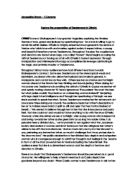Explore the ways in which Shakespeare the character Othello, his relationship with Desdemona and how he is viewed in that society in Act 1 Scene 111 up to line 296.
Alex Stockton
English Literature
Explore the ways in which Shakespeare the character Othello, his relationship with Desdemona and how he is viewed in that society in Act 1 Scene 111 up to line 296.
Othello’s character is conveyed in a number of ways, ranging from the writing techniques such as stylistic features and dramatic devices to the more obvious quotations from the various unique and challenging characters Othello has to deal with. This essay will describe a number of these ways in which Shakespeare coveys ‘The Moors’ character. This essay will also explore his relationship with his new found wife, Desdemona and also how he his viewed not only by the other characters but also the society of Venice.
Firstly this essay will explore the various ways in which Shakespeare conveys Othello’s character. The most prominent way and also the most obvious method Shakespeare uses to convey Othello’s character is dramatic irony. This technique is when there is a discrepancy between what that particular character knows and what the viewer’s/audience knows. For example in this play Othello truly believes that his friendship with Iago is genuine. On the other hand the audience know this trust is ill placed. We know that Othello is a brilliant general, the most trusted in the Venetian army. He is totally at ease and confident with his ability to command men but the same cannot be said with his social ability, and his confidence in his own character. He is aware that he is possibly way above his station within the army and Desdemona’s choice to marry him is similar in that some would believe the match is not suitable. Therefore dramatic irony helps show the audience the flaws in Othello’s character. This flaw allows space for Iago’s deceptions. He is obviously a bad choice of character, saying that ‘Iago is most honest’ (II.iii.7). This is ironic because Iago is anything but honest, and the audience knows this. Othello throughout the play makes ironic statements about Iago similar, such as ‘I know, Iago, Thy honesty and love doth mince this matter’ (II.III.251-52) and ‘O, thou art wise! 'Tis certain’ (IV.I.87). These statements only highlight Othello’s inability to judge a person’s character. I believe he knows he is weak in this trait, increasing his paranoia and lack of confidence when even the slight chance his trust has been misplaced. Even though his heart is saying he trusts Desdemona, him saying he would make her an "emblem of purity and trustworthiness" and to place her on a pedestal suggests that his head isn’t totally sure of her honesty. Furthermore Othello is aware of Desdemona’s strong personality because he has seen it forehand when she married Othello against her father’s wishes. When Desdemona’s father utters the line ‘Look to her, Moor, if thou hast eyes to see. She has deceived her father, and may thee’ (I.III.317), this would of played over and over in Othello’s head when he starts to doubt his wife. If she deceives he own father in order to get what she wished, then what’s stopping her doing it to Othello, especially when he knows she wouldn’t of otherwise married him had it not been for his stories and experiences.









